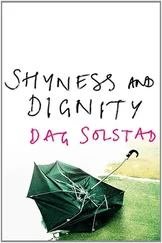He sat in a wheelchair in a newly cleaned (Mari Ann), tidy and smartened-up flat. His son was not there, but he had left a letter. He wrote that he had found another furnished room, it was the most practical thing to do. Anyway, he had never intended to stay with him longer than necessary, only until he had got himself another place. Now he had found one in a residential area, a short distance from the town centre, in the basement of a villa, where he had a bachelor flat with a private entrance. Incidentally, he would visit him one day at Easter, since he would not be going away but would stay home and read. Best regards from Peter.
At Easter a community nurse came every day and prepared food for him, did the housework and helped him with what he needed; there were two of them taking turns now and after the holiday he would become acquainted with several more. They all had a key and let themselves in. Already before Easter was over they insisted that Bjørn Hansen should try to take part in preparing his own meals — that was the best way, they said, one had to try to do as much as possible oneself — ‘It’s for your own good. Being self-reliant gives you a positive attitude to life,’ they said.
One day the doorbell rang. Twice. But Bjørn Hansen didn’t open. For some reason or other he got the idea that it might be Turid Lammers and he didn’t want to see her. He hadn’t seen her in the five years since he moved out of the Lammers villa, apart from a few times at a considerable distance, and then he had turned round or made a detour. Nor had she looked him up, but it occurred to him nevertheless that it could be Turid Lammers when the doorbell rang. She was bound to be driven by a deep need to see him, with her own eyes, sitting in a wheelchair. And then they could have resigned themselves, she to her pity, he to his purification. He would do everything in his power not to be seen, and to avoid talking to Turid Lammers in his present physical condition. But it did not need to have been Turid Lammers who rang the bell. It could, for example, have been Herman Busk. But he wouldn’t open for him either. Not now. Not yet.
However, it had not been Herman Busk. He rang up right after Easter and had been away at the time. He wanted to come over and see Bjørn Hansen, but Bjørn Hansen told him that, honestly, he wasn’t up to it yet, he must become stronger first, and Herman Busk understood. But a week later he rang again, and then about once a week for some time. Bjørn Hansen declined to meet him, but for entirely different reasons from the one he had for avoiding Turid Lammers.
Some time after Easter he wheeled himself through the streets to the Town Hall, where the Treasury was located. He had no problems travelling by wheelchair through the streets of Kongsberg, neither physically nor psychologically. He greeted some remote acquaintances and they returned his greeting as naturally as they could. At the Town Hall he managed to get in on the ground floor, but not higher up, to the first floor, where the Treasury was. Instead of making the effort of carrying the wheelchair with him in it up to the first floor, his subordinates came down to the ground floor, where he had manoeuvred himself into the space behind the information counter. There he was served coffee, also rolls and Danish pastry, which the junior clerk had been sent out in a hurry to buy. They said he looked very well.
As he was about to say goodbye and wheel himself out onto the street again, the alderman came, so he had a conversation with him, while the Treasury employees went back to their work. After a bit of waffling, during which the alderman enquired whether his sense of humour was still intact (I’ll be damned if I ever distinguished myself by a great sense of humour here in the Town Hall, Bjørn Hansen thought gruffly), he came to the matter in hand. About what would happen when the period of his sick leave had expired. The alderman assumed that Bjørn Hansen would then apply for a disability pension, so that they could start the process of appointing a new treasurer without delay. In the alderman’s opinion, Jorunn Meck stood out as a very interesting candidate, what did Bjørn Hansen think of that? Bjørn Hansen was taken aback. He had no intention of resigning as treasurer. He had taken it for granted that he would continue as before — after all, nothing stood in his way except for the practical problem of getting from the ground floor to the first. But to the alderman it seemed all but indisputable that Bjørn Hansen would resign as treasurer now that he was disabled. He said, however, that there was no need for him to be completely cut off from the Town Hall milieu. ‘We would like to take advantage of your expertise as a consultant,’ he said. Bjørn said nothing to that. If he had been genuinely disabled, he would have protested most sharply, but not now, he simply didn’t have the strength. His head swimming, he wheeled himself out of the Town Hall and through the streets to his flat on the other side of New Bridge.
Home. In his own flat. In a wheelchair. The former treasurer of Kongsberg. Fifty-one years of age. The days went by. Time passed. The community nursing office was very satisfied with him. They thought he showed a positive attitude. He demonstrated a strong desire to master the small everyday problems by himself, and in an astonishingly short time he was able to do the shopping, prepare his meals, do the dishes and the laundry himself (except for awkward items like bed-linen and the like). All that remained for the home help to do once a week was the cleaning (Mari Ann had quit and would sit her A levels in the spring) and the heavy laundry. However, a community nurse visited him once every twenty-four hours. To check on him, in case he should need help with something, which might well be the case. For example, to fetch a book from a top shelf. Or something could have happened to him which left him helpless. The days went by. Time passes. The high point of the day was the expedition to the supermarket to do the shopping. First, the laborious operation of getting through the door of his own flat. Then into and out of the lift. Next, to get through the front door and fairly sail along the street to the supermarket, where it was cool and the floor was level and pleasant to roll along on. In the mornings there were few customers; he was almost alone among the mountains of merchandise. He wheeled his way down the aisles as though he were in the middle of a street, with enormous accumulations of, say, toothpaste, detergents, oranges, salami, cheese, milk, green apples, red apples and hamburgers on both sides. He took his time in there, sometimes more than an hour, rolling back and forth in the streets of the supermarket and picking up what he needed. He came to know the staff very well, both the women at the checkout and those who ran about supplying the shelves with constantly fresh tomatoes, mince, cream, fabric conditioner. He had the impression that they liked him. He was a kind of dignified invalid. Not obtrusively noisy or cheerful. Not steeped in suffering. But friendly and resigned in all his dealings.
Sometimes he would also wheel himself down to Lågen to look at the river. Or he rolled about the streets. Then he would often strike up a conversation with old acquaintances, who all seemed relieved that he had confronted his fate with such composure. Did that make him feel ashamed? No, he considered their reactions with an inexpressible remoteness. About the same as when his son visited him, just after Easter. If the doorbell rang now, he opened the door. The worry that Turid Lammers might be standing outside he now regarded as fanciful. And Herman Busk would not come. He spoke to Bjørn Hansen by telephone. Then Bjørn could interrupt the conversation if he felt something emerge from deep down that made it impossible for him to continue. Outside the door a seller of raffle tickets or a child might be standing. Or sometimes the community nurse (one of three women), or the home help, a black man about thirty who came once a week. Did he fear being found out? Not at all. For that, his case was too unbelievable. He did not have to sit on tenterhooks when visited by the community nurse, wondering whether he behaved correctly at every moment. Even if he should get excited or be careless, make movements that a trained nurse knew were incompatible with the movements a man who was paralysed from his hips down could possibly make, she would never have registered it. For the possibility that he might do it did not exist for her, so that, even if she had seen something, she would still not have seen anything. Indeed, even if she had seen him get halfway to his feet in the wheelchair to reach a volume in the bookcase, she would not have believed her own eyes. Of that he was absolutely certain.
Читать дальше












